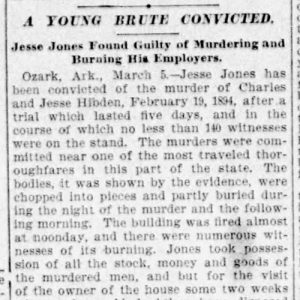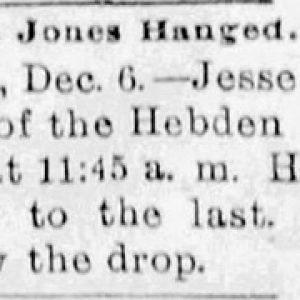calsfoundation@cals.org
Jesse Jones (Execution of)
Jesse Jones was hanged at Ozark (Franklin County) on December 6, 1895, after being convicted of killing, dismembering, and burning a pair of horse traders from the Indian Territory, a crime he denied committing to the end.
Jesse Jones was born around 1872 near Eureka, Spencer County, Indiana, one of six children in the prominent farming family of Charles S. Jones and Lewesa Jones. He left home in 1892 and traveled to Florida; St. Louis, Missouri; and Texas before ending up in the Indian Territory (modern-day Oklahoma), where he was hired to run a wagon and cook for horse dealers Charlie and Jesse Hibdon.
The three men left Paolo in the Chickasaw Nation in early 1894 to drive a herd of about fifty ponies into Arkansas to be traded for cattle. On February 18, 1894, they were spending the night in a cabin about three miles west of Booneville (Logan County). Witnesses later reported hearing two gunshots around midnight, “and following the shots were heard, pounding as if some one was cutting up meat.” The next day, Jones was seen outside the cabin with a Winchester rifle “as if he was on guard,” and the cabin burned to the ground several hours later. Jones claimed that the Hibdons said they were being pursued by U.S. marshals and had fled.
A few weeks later, the cabin’s owner arrived from the Choctaw Nation and found bones in the burned remains of the cabin, which a local physician identified as being human. Jones was indicted for grand larceny and two counts of first-degree murder. At a special term of the Logan County Circuit Court, the victims’ mother testified that Jones had the traders’ belongings and “every statement of Jones in regard to the Hibdons were proven false.” A jury deliberated only twenty-five minutes on April 9, 1894, before convicting him of the murder charge. He was sentenced to hang on May 18.
In May 1894, Indiana officials asked Governor William Meade Fishback to commute the murder sentence “in regard to Jones’ high family relations,” while Logan County “citizens…are signing a remonstrance against the petition from Indiana.” An Indiana newspaper noted that local people thought Jones was innocent of the crime, writing that “it cannot be denied at any rate, that authorities down there failed to give him time to prepare for a defense.” Fishback declined the commutation, but the Arkansas Supreme Court remanded the case back to Logan County for a rehearing.
Jones was granted a change of venue to Franklin County, where an improved legal team defended him in a five-day trial in the spring of 1895 in which “no less than 140 witnesses were on the stand.” Jones claimed at trial that Charles Hibdon had killed Jesse Hibdon, and on the stand “he interwove his statement with the testimony of the witnesses so logically that there was scarcely the shadow of contradiction.” Nevertheless, he was again convicted. Governor James P. Clarke set his execution for November 15, 1895, after the state Supreme Court upheld the jury’s verdict.
Jones’s father Charles Jones came to Arkansas in November and presented Clarke with letters from the governor of Indiana, U.S. Senator Daniel W. Voorhees, and others “testifying to the good character of the family.” Clarke granted a reprieve of the execution until December 6 but would not commute it. An Arkansas Gazette reporter who visited the condemned man in early December found him resigned to his fate, with Jones saying, “I am innocent of the crime for which I am to be put to death, if no one save God and myself believe it.”
He was taken from his cell at 11:00 a.m. on December 6 and mounted a wagon, giving a lengthy speech in which he again proclaimed his innocence even as he forgave the people who had testified against him in his trial. Jones mounted the gallows at 11:25 a.m., after which a preacher performed a religious service. Stepping onto the trap door at 11:40 a.m., he said, “I am ready to die. I am willing to die. God wants me to come to him. I am going home.”
A black cap was placed over his head at 11:44 a.m., and Jones said, “Good-bye,” when the trap door opened a minute later. “The rope stretched some, which caused his feet to touch the ground, but it was soon raised.” Jones was declared dead eight and a half minutes later, his neck broken.
For additional information:
“All Hope’s Lost.” Arkansas Gazette, July 16, 1895, p. 2.
“Arkansas News.” Arkansas Gazette, April 11, 1894, p. 1.
“Died Game.” Arkansas Gazette, December 7, 1895, p. 1.
“The Hibdon Murder.” Arkansas Gazette, May 13, 1894, p. 9.
“Jesse Jones Granted a Stay.” Arkansas Gazette, November 12, 1895, p. 2.
“Jones Granted an Appeal.” Arkansas Gazette, May 17, 1894, p. 2.
“Murderer Granted Reprieve.” Forrest City Times, November 15, 1895, p. 8.
“Must Hang.” Forrest City Times, July 19, 1895, p. 8.
“No Hope for Jesse Jones.” Arkansas Gazette, November 6, 1885, p. 8.
“Ozark News.” Arkansas Gazette, December 3, 1895, p. 1.
“Indiana Boy’s Plight.” Evansville [Indiana] Courier and Press, May 10, 1895, p. 1.
Untitled. Boonville [Indiana] Standard, May 4, 1894, p. 1.
“A Young Brute Convicted.” Kansas City Star, March 5, 1895, p. 10.
Mark K. Christ
Central Arkansas Library System
 Law
Law Post-Reconstruction through the Gilded Age, 1875 through 1900
Post-Reconstruction through the Gilded Age, 1875 through 1900 Jesse Jones Conviction Story
Jesse Jones Conviction Story  Jesse Jones Execution Story
Jesse Jones Execution Story 



Comments
No comments on this entry yet.